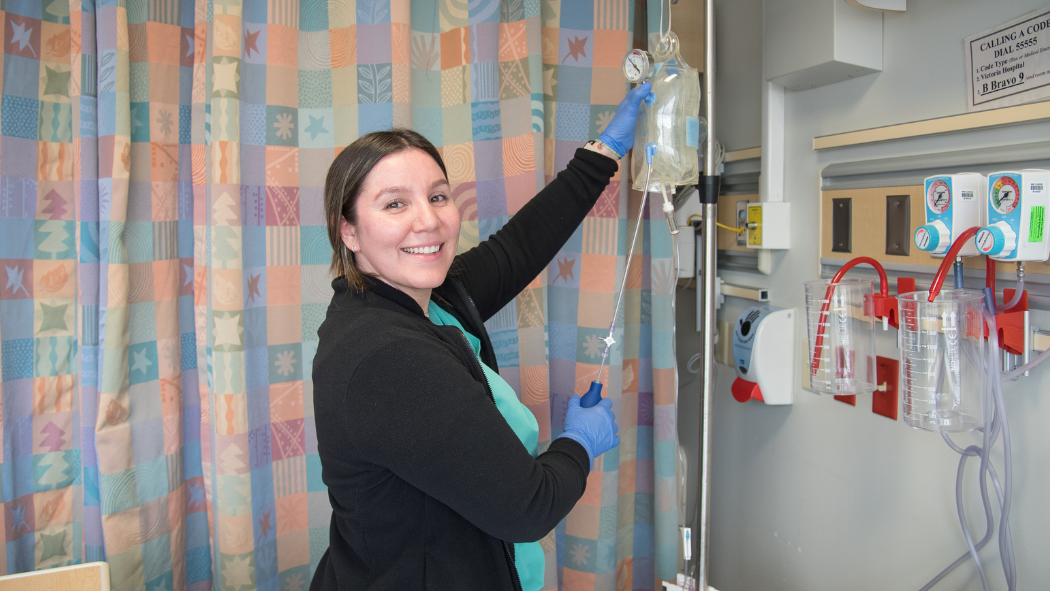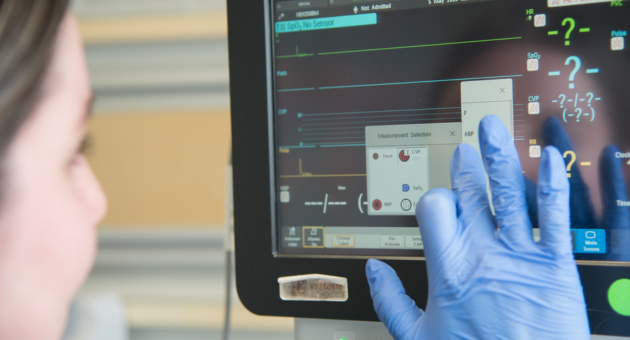
Pictured: Sydney St. Pierre practicing one of her new skills
May 14, 2025
A new initiative at London Health Sciences Centre (LHSC) is helping to reduce pressure on the intensive care unit (ICU) by training nurses to care for higher acuity patients outside traditional intensive care spaces.
Dubbed the upskilling initiative, this standardized training program facilitated by Inpatient Surgical Services, the Critical Care Trauma Centre (CCTC) and Nursing Practice Excellence and Innovation (NPEI), has been rolled out in select level two inpatient units across Victoria Hospital. It helps nurses working in these units gain the skills needed to care for patients who are too sick or injured to be in a regular unit (level one) but are stable enough to be cared for outside of the ICU (level three).
“This initiative combines the best of both worlds, allowing patients to receive the right care, in the right place, at the right time,” says Dr. Kelly Vogt, LHSC’s trauma medical director. "By having nurses from our Trauma Observation Unit (a level two unit) train with our ICU nurse experts, they’re now able to provide a higher level of care to patients who still need robust monitoring but can safely be cared for outside the ICU.”
Vogt says the initiative was born from a desire to find innovative ways to increase capacity in the ICU, which cares for upwards of 10,000 patients annually. When the Inpatient Surgical Services, CCTC and NPEI teams began brainstorming, they realized adding just a few extra skills to a level two trained nurse’s repertoire would mean as many as 50 to 100 patients per year could avoid spending more time than necessary in the ICU.
“Our goal is to reduce length of stay, as well as ICU conservable days, which is when a patient no longer needs to be in the ICU but there’s no other spot for them to go because they have a piece of equipment or something else that makes a traditional ward not suitable for them,” explains Vogt.

This new robust training initiative was designed to standardize skill levels for staff across all level two units. It includes in-class learning with critical care clinical educators, certifications, competency checklists, tests and buddy shifts with nurses in the ICU.
“It was pretty intense,” says Sydney St. Pierre, a registered nurse (RN) in the Trauma Observation Unit and one of the first nurses at LHSC to complete the program. “It really helped me become confident in my ability to make critical decisions in real time, and it’s been an amazing feeling knowing we can now provide a higher level of care for patients when they need us most.”
St. Pierre and other level two trained nurses now have more advanced skills for monitoring vital body systems, such as the heart, lungs and brain. Some of their new skills include adjusting intravenous (IV) blood pressure medication doses, using arterial lines to monitor blood pressure, helping patients breathe using supportive technologies like BiPAP and CPAP machines, inserting feeding tubes and performing procedural sedation to safely calm patients before medical procedures.
St. Pierre credits the nurses and clinical educators on the ICU team for her success with these new skills – and for helping alleviate some of the anxiety that comes with using them on the floor for the first time.
“The ICU team was there with us, shoulder-to-shoulder, every step of the way,” explains St. Pierre. “They made sure we were as prepared as possible for any situation we might encounter and continue to be available to advise us on the floor when needed.”
Vogt says the trauma team is equally happy with the results of the training initiative, which has been completed by 34 nursing staff to date.
“We're thrilled to see how well the level two unit nursing teams picked up on these advanced skills,” explains Vogt. "I’m immensely proud of the collaboration that has gone into making this initiative a reality and look forward to us eventually rolling it out across all level two units across LHSC.”